Suggested Use of Candidate Pages & Project Disclaimer
Note: There are a few ways to use this page. It mixes objective source material with light analysis and first-hand reporting so voters can choose their depth.
How to get the most out of this candidate page
- Start with the Quick Summary. Click the Quick Summary button underneath the websites section. It gives you the fast take: what we know from sources + brief analysis from a “data collector / local reporter” point of view.
- Scan the objective sources. If you want more data, jump into the source material we’ve collected:
- Official campaign website (if available)
- Social media pages and posts (if available)
- Interviews (video/audio) and transcripts (if available)
- Check the agenda & positions. Look for the candidate’s stated agenda and issue stances. We try to group them plainly so you can compare across candidates quickly.
- Read the Transparency/Accessibility rating. For a deeper look at how transparent the candidate has been (web presence, interviews, follow-ups, meet n greets) and how communicative they've been in response to outreach, see the rating and its short explanation. This helps you understand what’s easy to find and who is easy to contact.
- Use the page as a multi-layered hub. If you 'just want the facts', stick to the source documents. If you want opinions about transparency, accessibility, and communication, check the transparency meter. If you want coverage somewhere in between, like interviews that range from introductory to moderately pressing, watch the interviews. Choose your own adventure.
Where we add context or opinion, it’s to help busy voters make sense of gaps in local information. Not everyone has time to be a volunteer politico.
Robert McQuade
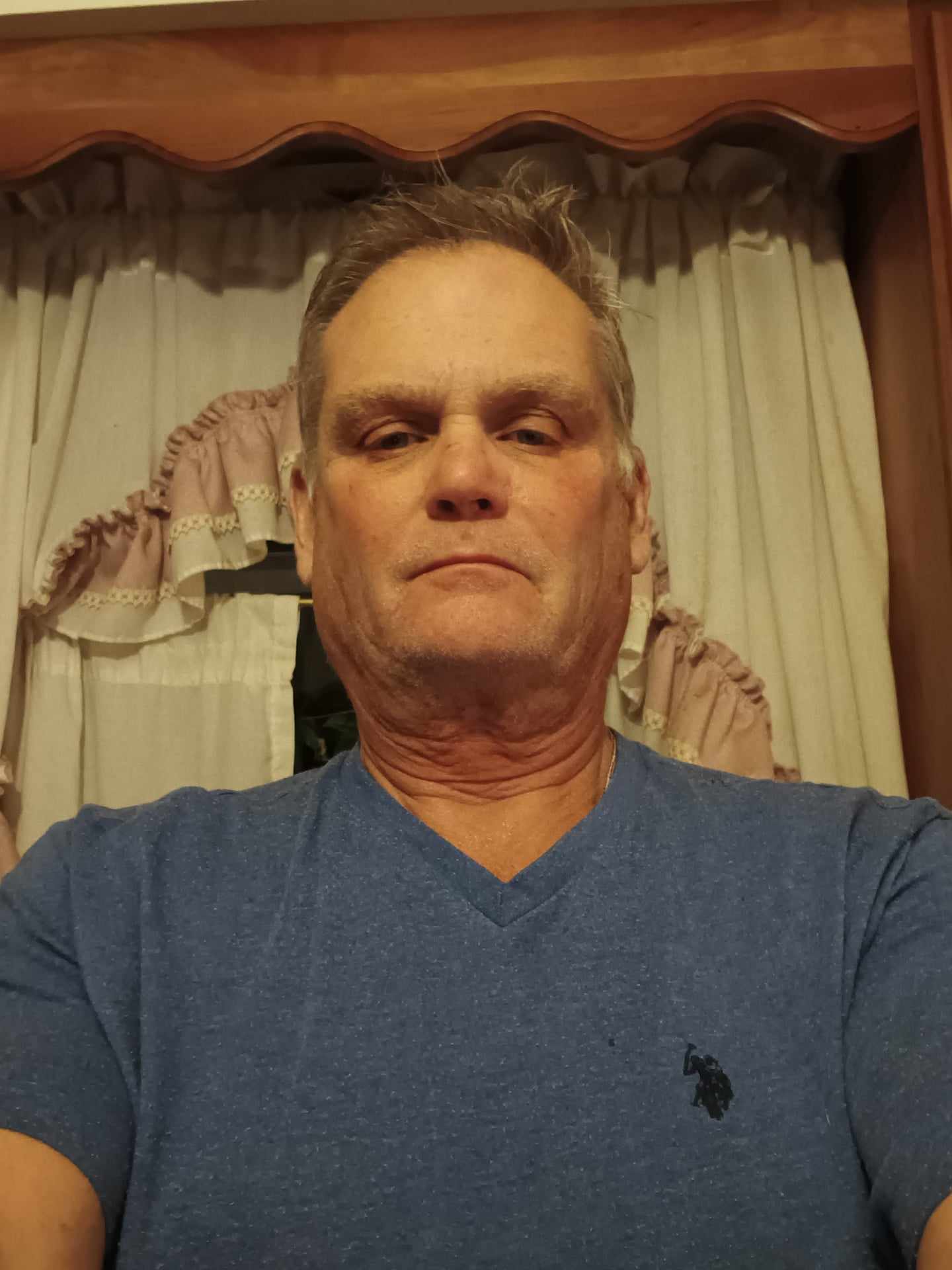
Websites
Quick Summary
Robert McQuade is a dedicated community leader with extensive experience in public service. Having served on the Millville School Board for
nine years and as a City Commissioner for one year, McQuade brings a wealth of hands-on governance experience to his campaign.
His platform focuses on improving Millville’s infrastructure, cleaning up streets, and addressing the city's ongoing police staffing shortages.
McQuade advocates for a more accessible government, emphasizing the importance of community engagement through initiatives like the Community
Relations Board and Millville Ambassadors.
A strong proponent of economic development, McQuade is committed to boosting Millville’s economy through projects like the Nabb Ave road extension
and supporting local businesses. He also addresses social issues such as homelessness, advocating for better solutions like the M25 initiative
to provide housing for those in need.
McQuade’s stance on cannabis sales is cautious; he stresses the importance of considering community input and proximity to schools before
making any decisions. With a focus on transparency, accessibility, and collaborative leadership, McQuade aims to foster a Millville that is
safer, more prosperous, and more connected to its citizens.
Click the red x at the top of this box and then scroll down down for more in-depth information and sources.
This election is on November 4th, 2025









Videos
2024 InformTheVoteNJ Interview With Robert McQuade
📋 Click here for full interview summary 📋
In this 1 hour 24-minute interview, Robert McQuade, candidate for Millville City Commissioner, joins InformTheVoteNJ.com's Steven Solof for an in-depth conversation about his experiences, motivations for running, and perspectives on local issues. McQuade shares his history in Millville's local government, his time as a police officer, and his work on the School Board. He also discusses key issues facing the city, such as public safety, economic development, homelessness, and the importance of community involvement.
Personal Background and Commitment to Millville:
McQuade emphasizes his lifelong connection to Millville, his family’s roots in the city, and his deep desire to make a positive impact. He shares the challenges he’s faced over the years, including personal losses and setbacks, and how these experiences have fueled his drive to help the community.
Police Experience and Community Policing:
McQuade draws on his experience as a part-time police officer to advocate for increased police presence, especially through community policing efforts that focus on building relationships with residents and addressing quality-of-life issues in parks and public spaces.
Addressing Homelessness:
McQuade discusses the issue of homelessness in Millville, suggesting that while the city faces challenges, it requires a joint effort from both local and county officials to provide solutions. He advocates for coordinated resources and community engagement to help homeless individuals get back on their feet.
Economic Development and Infrastructure:
McQuade talks about the balance between economic growth and preserving the character of Millville. He highlights the Nabb Avenue Extension project, road safety concerns, and the need for a competitive job market with fair salaries for city employees.
Final Thoughts:
McQuade underscores his dedication to Millville and his belief in local government’s role in improving lives. He stresses the importance of being hands-on, accessible, and proactive in solving problems, and invites voters to engage with his campaign as he seeks to continue serving the city he loves.
⏳ Click to view timestamps, topics, and takeaways ⏳
Interview Summary – Robert McQuade
This table highlights the key topics covered in the interview, summarizing major takeaways per section.
| Timestamp | Topic | Key Takeaways |
|---|---|---|
| 0:00 | Intro & Background | McQuade introduces himself, detailing his background in the Millville School Board, City Commission, and law enforcement. |
| 3:19 | City Commissioner Experience | McQuade reflects on his time as a commissioner, including working on streets and roads, and tackling issues like squatters and drug activity. |
| 6:01 | Police Experience | McQuade shares details about a bar fight incident and his history as a part-time police officer. |
| 14:13 | Community Policing | McQuade stresses the importance of building trust through community policing and increasing police presence in public areas. |
| 18:11 | Homelessness | McQuade discusses how homelessness is a broader issue that requires local and county coordination to address effectively. |
| 23:04 | Economic Development | McQuade talks about balancing economic growth with preserving Millville’s character, with a focus on tourism and infrastructure. |
| 31:00 | Nabb Avenue Extension | McQuade advocates for speeding up the Nabb Avenue Extension project to ease traffic and stimulate economic growth. |
| 34:23 | Salary Competitiveness | McQuade addresses the need for competitive salaries for public safety and city employees, advocating for better compensation to reduce turnover. |
| 37:30 | Water/Sewer Issues | McQuade discusses the need for voluntary connections to the water and sewer system in Laurel Lake, addressing concerns over cost and fairness. |
| 40:46 | State Mandates vs Local Needs | McQuade talks about the tension between state mandates and local needs, advocating for strong negotiation with state officials. |
| 45:04 | Section 8 Housing | McQuade reflects on Millville’s reliance on Section 8 housing and the social challenges that come with it. |
| 50:01 | Civic Engagement | McQuade emphasizes the importance of local government and community involvement in solving problems. |
| 55:24 | Police Presence & Safety | McQuade reiterates the value of increased police presence in maintaining public safety and order in Millville. |
| 1:02:59 | Sewer Infrastructure Funding | McQuade discusses funding options for sewer and water infrastructure in Millville, focusing on equitable solutions for residents. |
| 1:04:59 | Broadband Access | McQuade addresses Millville’s need for broadband expansion, considering the funding and priorities for the project. |
| 1:06:00 | Local & State Collaboration | McQuade talks about the importance of working with state officials and leveraging relationships to secure resources for Millville. |
Man on the Street at the Millville Car Show – Robert McQuade & David Summers for City Commissioner
📋 Click here for full interview summary 📋
At the Millville Car Show, Steven Solof of InformTheVoteNJ.com caught up with Robert McQuade and David Summers, both candidates for Millville City Commissioner. In this on-the-ground conversation, McQuade and Summers discuss the energy of this year’s car show, their backgrounds, and what they hope to accomplish if elected.
McQuade’s Priorities:
McQuade explains he’s seeking to return to the Commission to finish projects he helped launch — cleaning and beautifying city streets,
working alongside the Streets and Roads Department, and addressing unfinished clean-up sites. He also outlines his interest in 21st Century
grants to create after-school and weekend activities for youth and reopening the local lake for family recreation.
Community Event — Millville Neighborhood Cleanup Day:
This brings up an upcoming community event hosted by the Holly City Development Corporation:
Thursday, September 25, 1:00–5:00 PM. Registration link:
link to come after Google verification.
Summers on Homelessness & Outreach:
Summers draws on his past with car clubs to describe the event’s record turnout and pivots to homelessness and outreach, saying that many
people are unaware of the bus service to the shelter or the process for receiving benefits. Both candidates stress the need for better
communication and community participation, from clean-up days to churches helping connect services.
Closing Notes:
The interview closes with McQuade giving out his personal phone number for residents to reach him (609-501-2437)
and noting his long-time volunteer service picking up and disposing of unwanted televisions. Summers emphasizes that many people need liaisons to help
navigate “due process” and access existing programs.
⏳ Click to view timestamps, topics, and takeaways ⏳
Interview Summary – Millville Car Show (McQuade & Summers)
This table highlights the key topics covered in the interview, summarizing major takeaways per section.
| Timestamp | Topic | Key Takeaways |
|---|---|---|
| 0:00 | Event Atmosphere | Both candidates describe the car show as one of the best in years, with big turnout, fun cars, and familiar faces. |
| 1:00 | McQuade on Campaign Updates | Wants to return to the Commission to finish cleaning streets, painting curbs, and pushing stalled projects (like the factory site). Highlights hands-on work with Streets and Roads. |
| 2:05 | Community Clean-up Day | Solof plugs Holly City Development Corporation’s Millville Neighborhood Cleanup Day (Sept. 25, 1–5 PM); both candidates plan to attend and finish unfinished railroad track cleanup. |
| 3:00 | Youth Activities & Lake Reopening | McQuade would pursue 21st Century grants for after-school programs; also hopes to reopen the lake for public recreation despite costs for lifeguards and an officer. |
| 3:50 | Homelessness & Outreach | Summers notes a bus exists to bring people to the shelter but it’s not well advertised. McQuade mentions shelter rules separating families, proposes church involvement, recounts a local woman’s hardship, and criticizes panhandling issues. |
| 6:40 | Accessibility & Personal Service | McQuade shares his phone number (609-501-2437) and describes his 13-year volunteer effort picking up TVs for residents. |
| 7:20 | Information Gaps & Liaisons | Summers points out many people don’t know how to access entitlements; Solof raises the idea of more liaisons to “connect the dots.” Both agree better communication is needed. |
| 8:00 | Wrap-Up | Interview ends with thanks and a reminder that InformTheVoteNJ helps voters become more informed. |
Talk Around Millville (WVLT): Dave Summers & Robert McQuade — Cleanup, “Trash Tax,” Broad St., & Bringing Civics Back
📋 Click here for full interview summary 📋
Steven Solof (InformTheVoteNJ.com) joins The Talk Around Millville on WVLT 92.1 FM with Robert McQuade and David Summers, both candidates for Millville City Commissioner. The conversation spotlights Summers’ background and priorities—hands-on city cleanups, common-sense trash policy, and listening to residents—while weaving in McQuade’s experience on the school board and commission, plus caller Q&A on roads, rentals/code enforcement, and youth activities.
About the show:
The Talk Around Millville is a weekly, call-in program hosted by McQuade & Summers, inviting residents to discuss
Millville’s needs—making the candidates regularly accessible, transparent, and communicative.
📅 Tuesdays, 6–7 PM • 📻 WVLT 92.1 FM • ☎️ (856) 696-0092
Highlights:
Summers’ 30+ years in local manufacturing (Wheaton/NIPRO), CNC programming & supervision, and hands-on community
cleanups (brought his own heavy equipment). Priorities include citywide cleanups, revisiting “trash tax” policy,
and a campaign “listening tour.” The group discusses rebuilding local press so residents and candidates can track issues,
practical civics education so people know how to navigate City Hall, Broad St. paving responsibilities, police staffing
limits for foot/bike patrols, and youth recreation ideas.
⏳ Click to view timestamps, topics, and takeaways ⏳
Interview Summary — Talk Around Millville (WVLT)
This table highlights the key topics covered in the interview, summarizing major takeaways per section.
| Timestamp | Topic | Key Takeaways |
|---|---|---|
| 00:00 | McQuade background | Union leadership; 9 years on school board; 11 months as commissioner. Emphasizes teamwork and needing two additional votes to pass anything. |
| 02:31 | Summers intro | Helped lead cleanups at the railroad tracks; brought his own heavy equipment. 30+ years at Wheaton/NIPRO; CNC programmer/supervisor; problem-solver. |
| 07:08 | Teamwork on the commission | Running as a ticket; collaboration ranked “20 out of 20.” Will work with whoever is elected. |
| 10:00 | Streets & Roads recap | Curbs/gutters cleaned and painted; bulk pickups; factory teardown backstory and environmental hurdles. |
| 13:45 | Summers’ priorities | Citywide cleanups; kudos to Parks & Rec; keep momentum from volunteer efforts. |
| 15:50 | Trash fees / “trash tax” | Re-examine bag fees and cost-shifting; large complexes/corporations should not offload trash costs onto residents. |
| 18:30 | Listening to residents | Plan to survey voters during the campaign and shape agenda based on feedback. |
| 19:30 | Rebuilding local press | Coverage gaps hinder voters; citizen livestreaming helps. Joe Smith mention; FB notifications often reach more people than YouTube. |
| 27:09 | Broad St. paving | County vs. city segments; grants prioritize high-travel roads. Residents should raise issues at meetings or with engineering. |
| 28:40 | Local civics education | Teach practical “how-to” so residents confidently contact the right departments and persist as needed. |
| 31:24 | Call-in info | Lines open for residents and candidates: (856) 696-0092. Host heads to the commission meeting afterward. |
| 33:05 | Caller: “What sets you apart?” | Experience, relationships with other candidates, need for coalitions to govern effectively. |
| 40:11 | Community Relations Committee | Public-stakeholder group to surface issues and prioritize solutions. |
| 41:27 | Downtown & public safety | High Street foot/bike patrols limited by staffing/union constraints; revive community events like Third Friday. |
| 44:52 | Youth recreation | Pool and courts as positive outlets; give teens structured activities. |
| 46:08 | Taxes & ratables | Consider selling certain city-owned parcels to adjacent owners to expand the tax base. |
| 47:43 | Green Acres parcel | Note on possible status change; could enable new uses if no longer under Green Acres restrictions. |
| 50:17 | Caller: rentals & blight | Inspections/code enforcement follow-through; example of addressing a squatter house with coordinated action. |
| 53:25 | Weekly show reminder | Tuesdays 6–7 PM on WVLT 92.1; call in with questions or concerns. |
2024 InformTheVoteNJ Interview With Robert McQuade (Part 2)
📋 Click here for full interview summary 📋
In this follow-up interview, Robert McQuade discusses his updated campaign agenda and compares himself to other candidates in the race for Millville City Commissioner. Key topics include the Citizen’s Community Relations Board, addressing homelessness, revitalizing High Street, and his stance on retail marijuana. McQuade also reflects on his volunteerism and boots-on-the-ground approach to local issues.
Community Engagement and the Citizen’s Community Relations Board:
McQuade explains his plan to establish a community board chaired by a citizen, allowing for more citizen input into local government decisions. The board will focus on community relations and strategic planning.
Addressing Panhandling and Homelessness:
McQuade discusses how he plans to address homelessness and panhandling in Millville, with a focus on working alongside organizations like M25 to get individuals off the streets and into support programs.
Retail Marijuana Sales in Millville:
McQuade shares his opposition to retail marijuana sales in Millville, citing concerns over the impact on crime and disorder in the city.
Revitalizing High Street:
McQuade discusses his vision for revitalizing High Street, including parking solutions and attracting new businesses to the area to boost downtown Millville.
Historic Racism and Systemic Issues:
McQuade reflects on the history of racism in Millville and the ongoing struggles with crime and economic conditions in the community, emphasizing the need for focus on community improvement rather than racial divides.
⏳ Click to view timestamps, topics, and takeaways ⏳
Interview Summary – Robert McQuade (Part 2)
This table highlights the key topics covered in the interview, summarizing major takeaways per section.
| Timestamp | Topic | Key Takeaways |
|---|---|---|
| 0:00 | Intro & Recap | McQuade joins for a follow-up interview to discuss his updated campaign and platform, addressing changes in the race and new developments in the city. |
| 1:00 | Citizen’s Community Relations Board | McQuade introduces his plan to create a community board to involve citizens more directly in local governance, focusing on strategic planning and neighborhood needs. |
| 3:30 | Millville Ambassadors Program | McQuade talks about the Millville Ambassadors initiative, aimed at involving citizens in local issues, despite some opposition from city officials. |
| 7:45 | Addressing Panhandling & Homelessness | McQuade discusses his plan for addressing homelessness and panhandling, including his efforts to work with organizations like M25 to provide housing and support services. |
| 14:20 | Retail Marijuana Sales | McQuade explains his stance against retail marijuana sales in Millville due to concerns about crime and disorder, referencing his past opposition to such initiatives. |
| 21:35 | Walsh Act Government Structure | McQuade compares the Walsh Act structure to a traditional mayoral system, highlighting the limitations of Millville’s current governance and advocating for change. |
| 26:50 | Historical Racism & Community Impact | McQuade reflects on Millville’s history of racism, acknowledging past issues but focusing on current challenges such as crime and economic inequality. |
| 31:45 | Revitalizing High Street | McQuade outlines his vision for revitalizing High Street, including parking solutions and attracting businesses to boost the local economy. |
| 36:10 | Collaboration with Local Schools | McQuade discusses his past collaboration with local schools and his intention to continue working closely with educational institutions to improve Millville. |
| 41:50 | Final Thoughts & Volunteerism | McQuade closes with reflections on his volunteer work, emphasizing his commitment to helping Millville residents and improving the city through direct involvement. |
2025 InformTheVoteNJ Interview With Robert McQuade
📋 Click here for full interview summary 📋
In this third interview, Robert McQuade dives into Millville’s ongoing challenges and his vision for the city's future. From street improvements and infrastructure updates to tackling police staffing shortages, McQuade provides a practical approach to solving Millville’s pressing issues. He also touches on his stance on cannabis sales and highlights the drawbacks of the Walsh Act form of government.
Agenda & City Improvements:
McQuade shares his goals for the city in 2025, including street and road cleanups, improved infrastructure, and fostering a better living environment in Millville.
Government Structure & Leadership:
McQuade discusses Millville’s current Walsh Act form of government, arguing for more decisive leadership and the potential advantages of a mayor-led system for better efficiency.
Economic Development:
McQuade emphasizes the importance of the NAB road extension and industrial growth as key economic drivers for Millville, underscoring the need for more ratables to fuel the local economy.
Police Staffing & Crime Solutions:
McQuade addresses the police staffing shortage in Millville and suggests utilizing grants, hiring class one and two officers, and enhancing community engagement to improve public safety.
Cannabis Sales & Community Impact:
McQuade shares his cautious view on cannabis sales in Millville, particularly focusing on the proximity to schools and the need for more community input before making a decision.
Community Engagement & Public Service:
McQuade stresses the importance of elected officials being visible and accessible, advocating for more in-person meetings and open communication channels between elected officials and Millville residents.
⏳ Click to view timestamps, topics, and takeaways ⏳
Interview Summary – Robert McQuade (Part 3)
This table highlights the key topics covered in the interview, summarizing major takeaways per section.
| Timestamp | Topic | Key Takeaways |
|---|---|---|
| 0:00 | Intro & Recap | McQuade returns for the third interview to discuss Millville’s future, focusing on key issues such as street improvements and police staffing. |
| 0:44 | Agenda & City Improvements | McQuade discusses his priorities for 2025, including cleaning up the city’s streets and improving the overall infrastructure of Millville. |
| 6:34 | Government Structure & Leadership | McQuade compares the Walsh Act to a traditional mayoral system and calls for more decisive leadership to streamline governance in Millville. |
| 10:01 | Economic Development | McQuade outlines his plans for the NAB road extension and industrial growth as key contributors to Millville’s economic development and increasing ratables. |
| 16:00 | Police Staffing & Crime Solutions | McQuade addresses the police staffing shortage, advocating for grants, hiring class one and two officers, and focusing on community engagement to tackle public safety concerns. |
| 23:08 | Cannabis Sales & Community Impact | McQuade shares his cautious stance on cannabis sales in Millville, particularly in terms of its proximity to schools and the need for more community involvement. |
| 27:01 | Community Engagement & Public Service | McQuade emphasizes the need for elected officials to be visible and accessible to residents, advocating for more in-person meetings and open communication channels. |
Transparency/Accessibility Rating: Above Average
Explanation
Robert McQuade continues to stand out as one of Millville’s most accessible and community-oriented candidates. Since we started covering his campaign last year, he has welcomed public dialogue through multiple channels—podcasts, sit-down interviews, and his weekly Talk Around Millville radio show on WVLT 92.1 FM, co-hosted with David Summers. That platform alone represents a rare model of real-time engagement, inviting residents to call in and discuss issues directly on air—something almost no other local candidate offers.However, McQuade’s 2025 campaign highlights an ongoing tension between personal accessibility and organizational consistency. While he attended events such as the Four Seasons Forum and the Brewery Meet & Greet (and was likely at the Housing Authority event), he canceled his appearance at the InformTheVoteNJ Candidates Forum—the only recorded forum of the cycle—after double-booking the same morning/afternoon to create his Facebook campaign page. On the one hand, that's a missed opportunity from someone pitching a community relations board for city commission, but the context matters: only a small fraction of Millville’s nineteen candidates attended the forum, and county politics at large still lack a consistent culture of centralized, recorded, public-facing campaign events and materials the public can conveniently review.
It’s fair to ask whether McQuade should be faulted for skipping one last-minute, privately organized forum when most of the field skipped as well. If such events were cultural norms rather than rare exceptions, expectations would be different. But in Cumberland County, transparency has long depended on a handful of citizen-led efforts—InformTheVoteNJ being the only entity this season to organize a centralized meet-and-greet and a recorded public forum. That reality reflects more on the system than on any one candidate.
McQuade’s approach to communication also bears nuance. He often prefers direct phone calls over written exchanges, and his social media posts sometimes contain grammatical or spelling inconsistencies that suggest correlation to his admitted learning disabilities, where he perhaps has a reliance on imperfect speech-to-text tools. These traits make his conversational accessibility genuine and personable, even if they occasionally hinder the formal polish of his digital outreach.
Ultimately, McQuade represents a form of transparency grounded in human accessibility rather than digital infrastructure. His enthusiasm for dialogue and accountability is authentic and ongoing, even if not always documented in a structured way. In a political environment where many candidates avoid engagement altogether, McQuade’s openness—despite imperfections—still sets a higher bar.
Overall rating: Above Average — consistently accessible and conversationally transparent, with minor organizational gaps that reflect broader cultural shortcomings in how Cumberland County handles campaign communication.
Agenda
-
Street & Road Improvements and City Cleanliness
Robert McQuade has made significant strides in improving Millville’s streets and public spaces. He focused on cleaning up the streets, painting curbs, and clearing gutters, working directly with the Streets and Roads department. His hands-on approach includes collaborating with local workers and addressing their needs through Total Quality Management (TQM), a system that puts employees in charge of improving their daily tasks. This practical approach aims to create a cleaner, more welcoming city for all residents.
McQuade is also actively involved in cleaning up areas like railroad tracks and vacant lots, ensuring the city is maintained properly. His collaboration with community members, such as candidate David Summers, highlights his willingness to tackle these tasks head-on, even utilizing personal equipment to clear waste. McQuade's ongoing engagement in these projects demonstrates his commitment to not just talking about improvements, but actually making them happen.
-
Community-Centered Governance
McQuade emphasizes the importance of hands-on leadership and staying connected with the people. His approach is to be the "People’s Commissioner" by attending to the concerns of residents directly, not just through formal meetings. He recalls his childhood experience of receiving care and support from Millville's firefighters and police officers, which has shaped his desire to serve the city. McQuade wants to bring back that personal connection, ensuring the public has a voice in city decisions and that officials are always approachable.
This commitment is reflected in his efforts to engage with the community beyond just official meetings. McQuade also emphasizes the importance of face-to-face interactions over digital communication, as he believes it fosters a deeper connection with residents. His personal philosophy of leading by example and working directly with the public has earned him respect as a hands-on and accessible leader.
-
Improving Millville’s Police Force and Public Safety
One of McQuade’s primary concerns is the police staffing shortage in Millville. He acknowledges that the city's police force has been understaffed for years, which has a direct impact on safety. He draws from his personal experience as a part-time officer to emphasize that even when there were around 85 officers, the department was still considered understaffed. McQuade believes that any number below that is inadequate to ensure public safety.
To address this, McQuade suggests a two-fold approach: first, securing federal grants to help fund additional officers, and second, increasing the number of class one and class two officers—officers who are less costly but still provide valuable patrolling and law enforcement. He also calls for a shift back to foot and bike patrols, which he believes can enhance police visibility and community interaction, making it easier to spot potential issues before they escalate.
-
Economic Development and Revenue Generation
McQuade understands that Millville’s economic future is tied to its ability to grow its tax base. One of his key priorities is expanding industrial development, particularly through projects like the NAB road extension. This extension would provide a more efficient truck route to Millville’s industrial park and airport, reducing congestion in residential areas and encouraging further investment. McQuade sees the expansion as a vital step toward bringing more business and jobs to the area, which in turn will increase local revenue.
Beyond physical infrastructure, McQuade emphasizes that the city must find sustainable ways to generate revenue without overburdening its residents. He opposes raising taxes as a solution, instead focusing on bringing in more businesses and leveraging existing resources. For McQuade, the key to a stable economy is not only industrial growth but also creating a balanced and fair tax system that benefits everyone.
-
Cannabis Sales and Zoning Issues
McQuade approaches the issue of cannabis sales with caution. While he supports medical cannabis for those in need, he expresses concern about the impact of recreational cannabis sales, particularly in relation to schools and neighborhoods. McQuade voted against a proposal to place a cannabis dispensary near a charter school on Weaten Avenue, citing the proximity to young children as a significant concern. He also raises the issue of cannabis sales in Millville, particularly in areas where the city has not yet decided on the appropriate zoning for dispensaries.
McQuade believes that the community’s opinion should be a major factor in determining where cannabis dispensaries are located. He advocates for listening to residents, local businesses, and other stakeholders before making decisions that could affect the entire city. McQuade’s cautious approach reflects his desire to balance economic growth with community safety and well-being.
-
Government Efficiency and Reform
McQuade is deeply critical of Millville’s current form of government under the Walsh Act, describing it as inefficient and outdated. He compares the commission system to a household where all members have equal power, making it difficult to get things done. Without a final decision-maker, important projects and decisions often stall. McQuade argues that switching to a mayor-led system would provide the leadership and clarity necessary for effective governance.
In his view, the Walsh Act system is a relic of the past and needs reform. He points to his experience on the city commission, where he worked with colleagues like Joe Suie to build consensus and address issues. However, he believes that to move Millville forward, the city needs a more decisive leadership structure, where a single individual can take responsibility for key decisions and drive the city’s progress.
Issues
-
Police Staffing and Crime Prevention
McQuade’s commitment to improving public safety is evident in his deep concern for Millville’s police staffing crisis. He identifies the shortage as a major obstacle to effectively addressing crime, particularly in high-risk areas. His plan includes bringing in additional officers through federal grants, increasing class one and class two officers, and enhancing community policing through foot and bike patrols. By directly engaging with the community, McQuade believes the police force can regain the trust of residents and work more effectively to reduce crime.
-
Economic Development and Industrial Growth
The NAB road extension remains a key focus of McQuade’s economic development agenda. This project is expected to unlock significant industrial potential by connecting Millville’s industrial park and airport more efficiently. McQuade is also focused on attracting more businesses to Millville by improving infrastructure and providing incentives for development, helping create a more vibrant local economy that provides more jobs and services to residents.
-
Public Engagement and Government Transparency
Transparency and public engagement are at the core of McQuade’s leadership style. He advocates for regular, in-person meetings with residents to ensure that their concerns are heard and addressed. McQuade has even suggested community meetings where residents can directly engage with city officials, fostering a more open, accessible government. His commitment to transparency ensures that the city’s leaders remain accountable and responsive to the needs of the people.
Background and Experience
-
Professional and Educational Background
Robert McQuade has dedicated much of his life to serving the Millville community. He has over 15 years of experience as a part-time police officer, during which he gained firsthand insight into local law enforcement challenges. In addition to his work in public service, McQuade has been actively involved in his community, particularly through the creation of the Center City Crime Watch, which he co-founded to address local crime and safety issues.
McQuade has also pursued education and training that supports his commitment to public service, constantly seeking ways to improve his ability to lead and contribute to the city. His direct involvement in the community has shaped his deep understanding of Millville's needs and priorities.
-
Experience in Government
Robert McQuade served as a Millville City Commissioner for 11 months, during which time he focused on improving city services and addressing pressing infrastructure issues. Although his tenure was brief, McQuade gained valuable experience working with city departments and engaging with residents on the ground.
Before his time as Commissioner, McQuade served for nine years on the Millville Board of Education. This experience allowed him to develop a strong understanding of local governance, public education, and the unique challenges facing Millville’s schools. McQuade’s commitment to improving public services is evident in his extensive work in both education and city government.
-
Community Leadership and Advocacy
McQuade co-founded the Center City Crime Watch, an organization dedicated to improving public safety and addressing crime concerns in the heart of Millville. Through this initiative, he worked closely with residents and local law enforcement to create safer neighborhoods and strengthen community engagement. His efforts reflect his belief in proactive solutions and community-based policing.
McQuade is known for his hands-on approach to leadership, frequently working directly with city departments and community groups. His experience as a part-time officer and his leadership in community safety initiatives have shaped his approach to governance, with a focus on collaboration, transparency, and service to the public.
-
Public Safety and Law Enforcement Experience
McQuade has served as a part-time police officer in Millville for over 15 years. This role has given him a unique perspective on the challenges faced by law enforcement, including staffing shortages and community relations. His experience in policing has informed many of his positions on public safety, crime prevention, and resource allocation for the police department.
His direct involvement in the field of law enforcement has led to a practical understanding of the importance of community policing, effective patrol strategies, and maintaining public safety through visible, accessible officers. McQuade's law enforcement background strengthens his candidacy, giving him the experience needed to address the city’s most urgent issues, such as staffing shortages and crime prevention.
Prior Election Coverage
Interview on QBC
Individual Agenda
- Community Policing - Increase police presence throughout the community and have them establish a friendly connection to the public. By establishing a friendly, communicative relationship with residents, police can become more aware of issues such as crime, homelessness, and road safety.
- Strong Coordination with County and State Representatives - Oftentimes issues going on in the city are also related to county and state jurisdictions. By maintaining strong relationships with representatives who handle different jurisdictions, problem-solving will be more efficient.
- Create a Citizens Community Board - In prior terms, McQuade had been involved with boards that invited members of the city to help identify issues, suggest methods for addressing those issues, and prioritize them. If elected, McQuade intends to establish such a board in Millville to help constituents feel heard and engaged.
- Hands-On Approach With the Community - McQuade intends to address problems directly as a citizen when appropriate and to ask community organizations like churches to help directly address problems.
Stances on Current Issues
The below interview comprehensively goes through current issues that incumbent Ranello and current Vice-Mayor Sooy brought up to us. That list of issues can be found here. McQuade addresses them in his own words starting at about 16:00, and we have a bullet point summary of that below the video.
Inform The Vote Interview
Inform The Vote Follow-Up Interview
- Disorderliness at Parks and Public Property - Increase community policing, which will help police become more directly aware of problems.
- Homeless encampments - Create zoned areas where people can stay so it's contained. Coordinate with county and state representatives to figure out where homeless people are coming from, as sometimes they are bussed in from cities like Atlantic City. Establish humane treatment programs to help get the homeless back on their feet.
- Economic development pros and cons - Keep commercial development to the designated areas such as the industrial parks. Coordinate with tourism areas like Cape May to help increase economic activity. Widen the junction at Route 49 and Route 47 to make traffic flows more appealing.
- Nabb Ave Extension and its alleged slow-moving pace - Coordinate with state and national reps like Senator Testa and Congressman Van Drew to see why it is moving slowly.
- City Salary Competitiveness - The city only has so much money to work with in its budget, so bringing the issues of crime stats and low salaries to Trenton could help make the state more aware of the city's struggles, and thereby get the state to send more money to the city.
- Road Safety and Off Road Vehicles - Police Chief Harvey had a system of using unmarked vehicles to observe and report similar problems in the past. Implementing a similar system could help address this current issue.
- Water and Sewage Infrastructure in Laurel Lake - Wants to keep the current expansion methods moving forward while making sure residents have an opt-out method so they are not forced to participate.
- State Mandates vs Local Needs - Wants to have some known people who can act as negotiators between the state and city. This will help ensure the city is compliant without acting against its own interests.
Experience
- Former Millville Board of Education member for 9 years
- Former Millville City Commissioner for 11 months
- Co-founded Center City Crime Watch
- Part-time police officer for 15 years
Media
When doing research for our site, we usually google each candidate's name to see what we can find, with varying results. When one googles candidate McQuade, an article regarding an arrest comes up, which makes it seem as though McQuade was arrested for being involved in a bar fight. However, as per our interview with McQuade, it seems as though a fight broke out when he arrived to pick up a friend from the bar, and McQuade, a special police officer with many certifications and recognitions in the community, went to perform a citizen's arrest on someone involved in the fight. He wanted us to share documentation of his credentials and recognitions to help clarify the articles online:
Vineland Police Special Officers Certification
If on desktop, right-click the image and select 'open in new tab' for a larger image
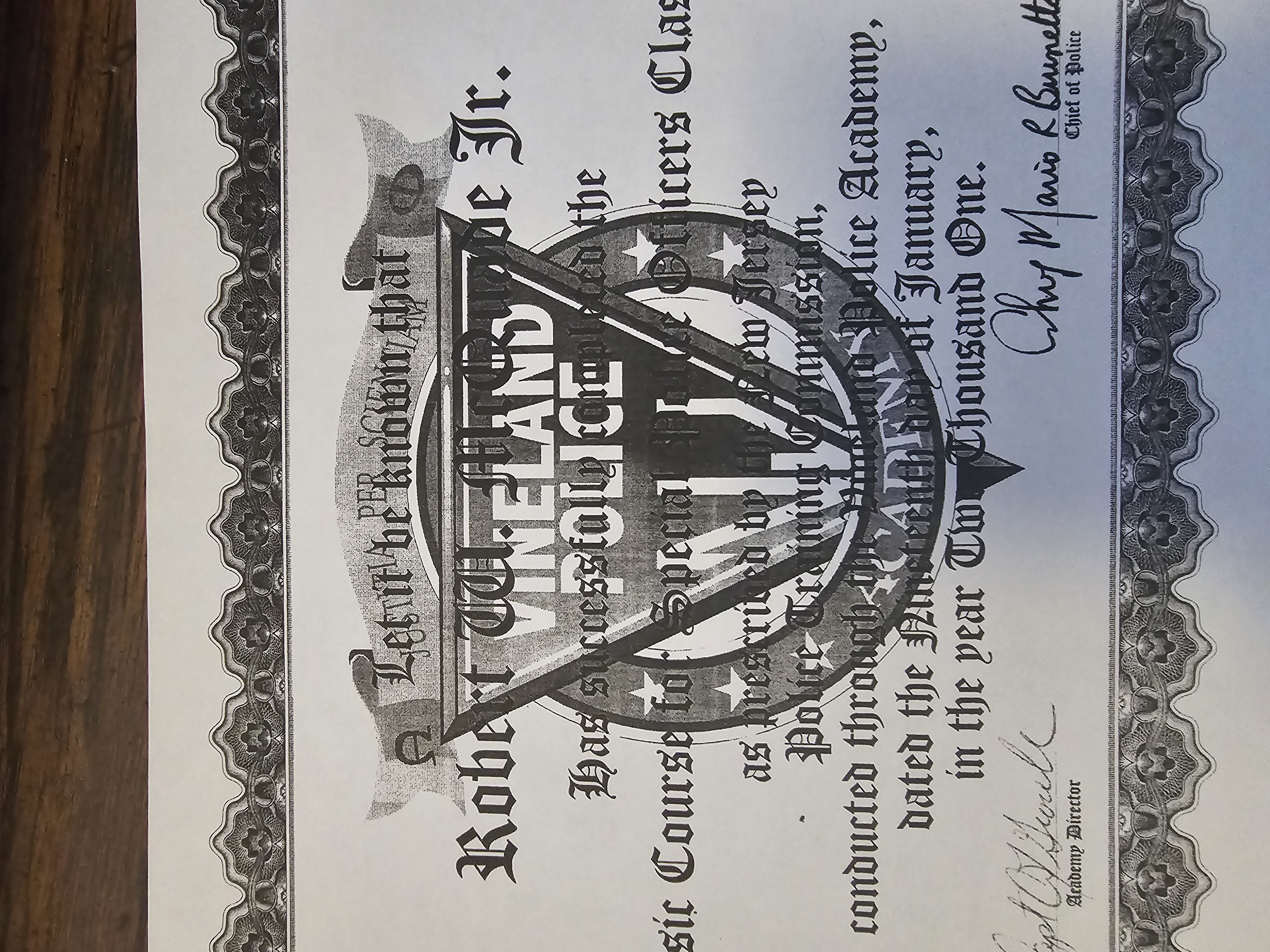
Public Safety Training
If on desktop, right-click the image and select 'open in new tab' for a larger image
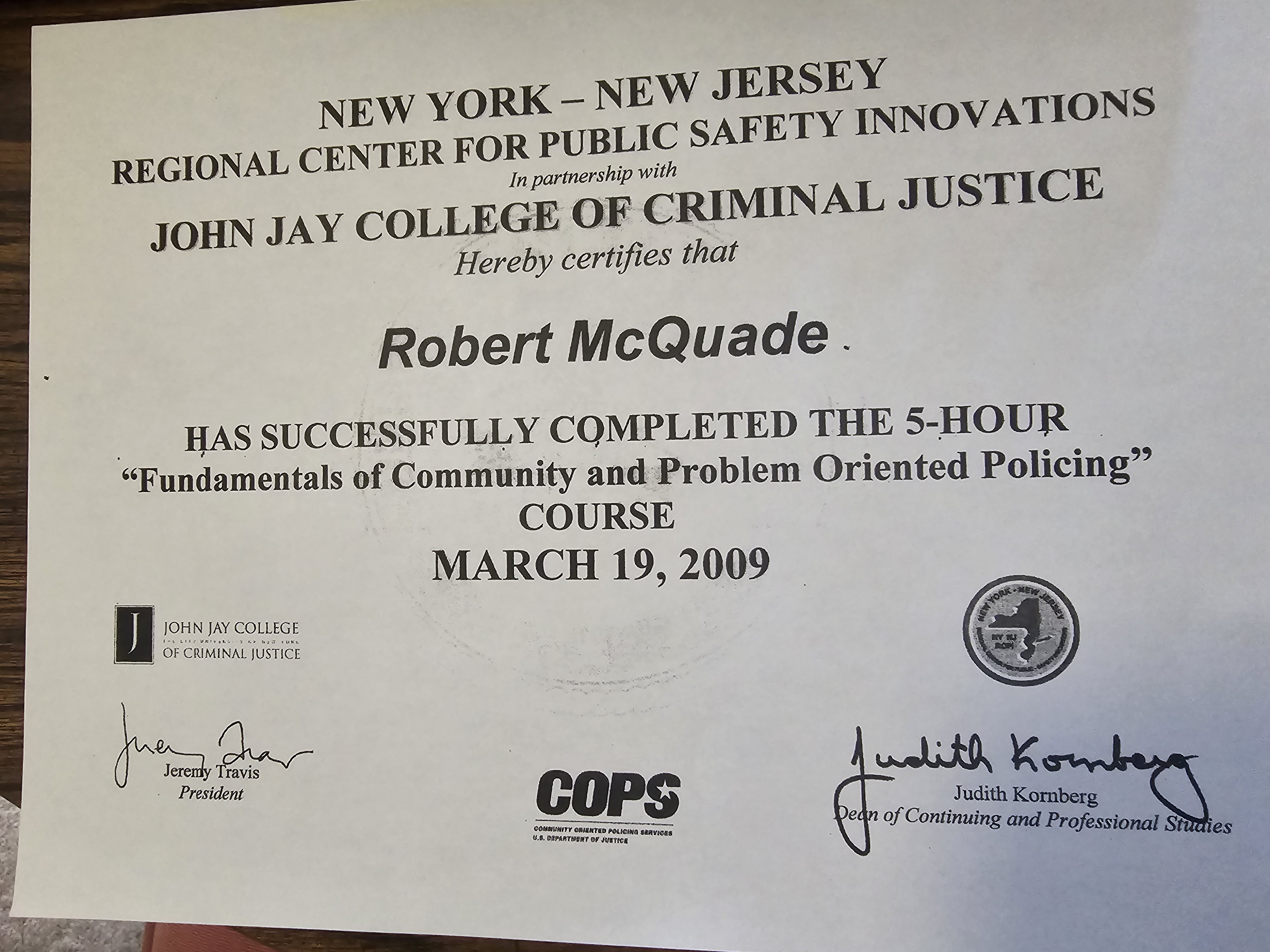
NJ Police Certification
If on desktop, right-click the image and select 'open in new tab' for a larger image
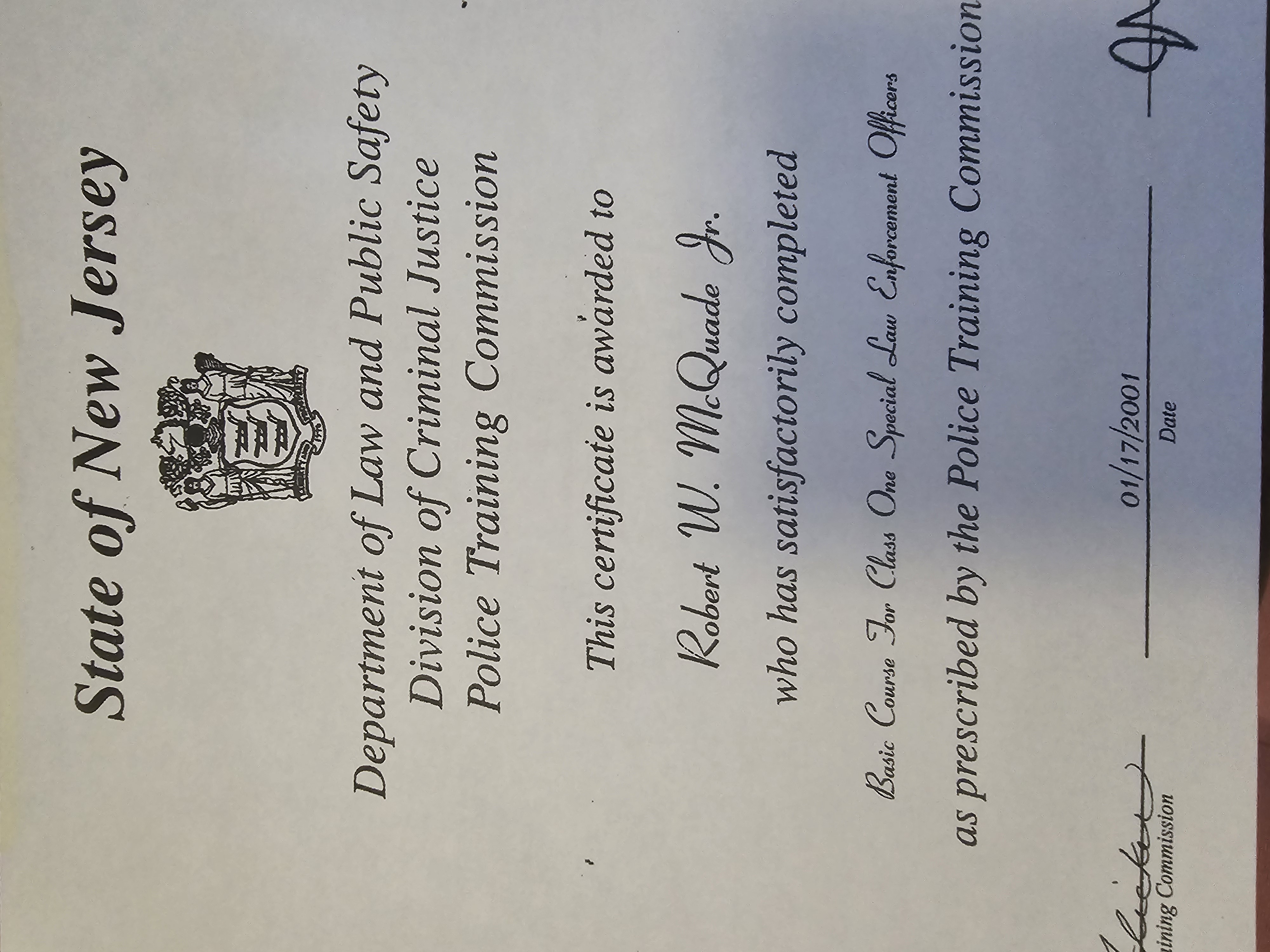
FEMA Emergency Management Certification
If on desktop, right-click the image and select 'open in new tab' for a larger image
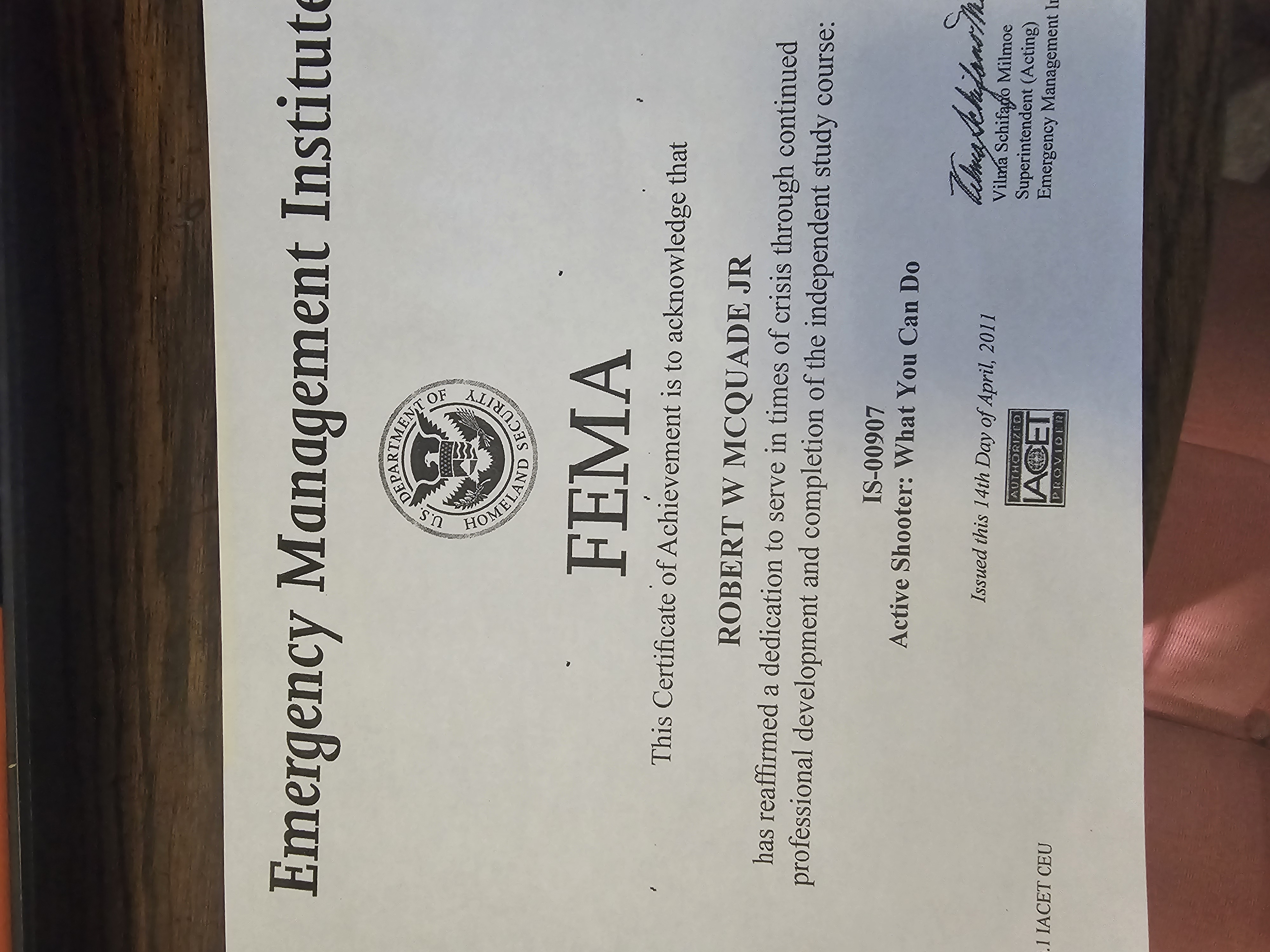
Cumberland Mall Recognition
If on desktop, right-click the image and select 'open in new tab' for a larger image
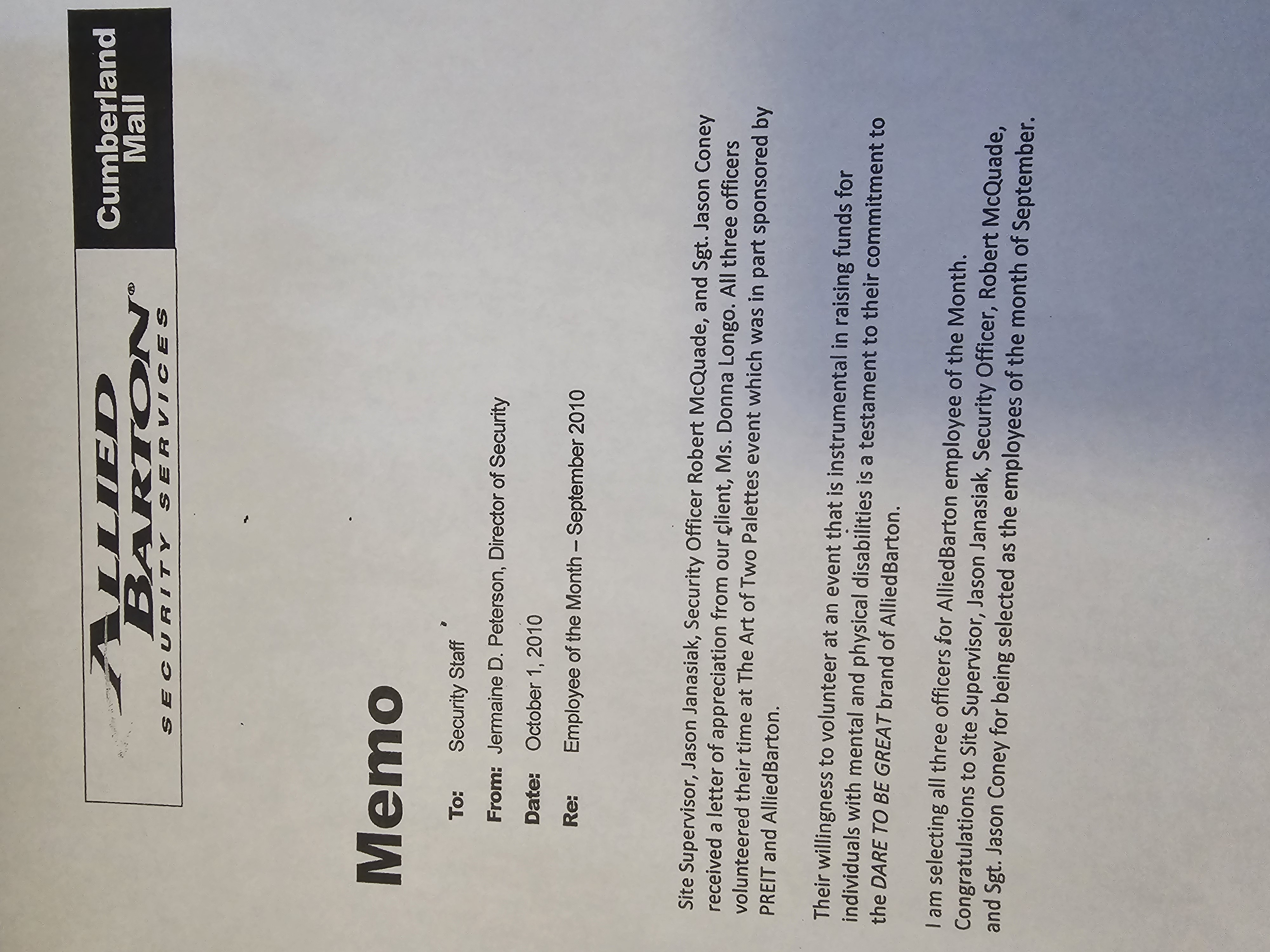
Allied Barton Employee of the Month
If on desktop, right-click the image and select 'open in new tab' for a larger image
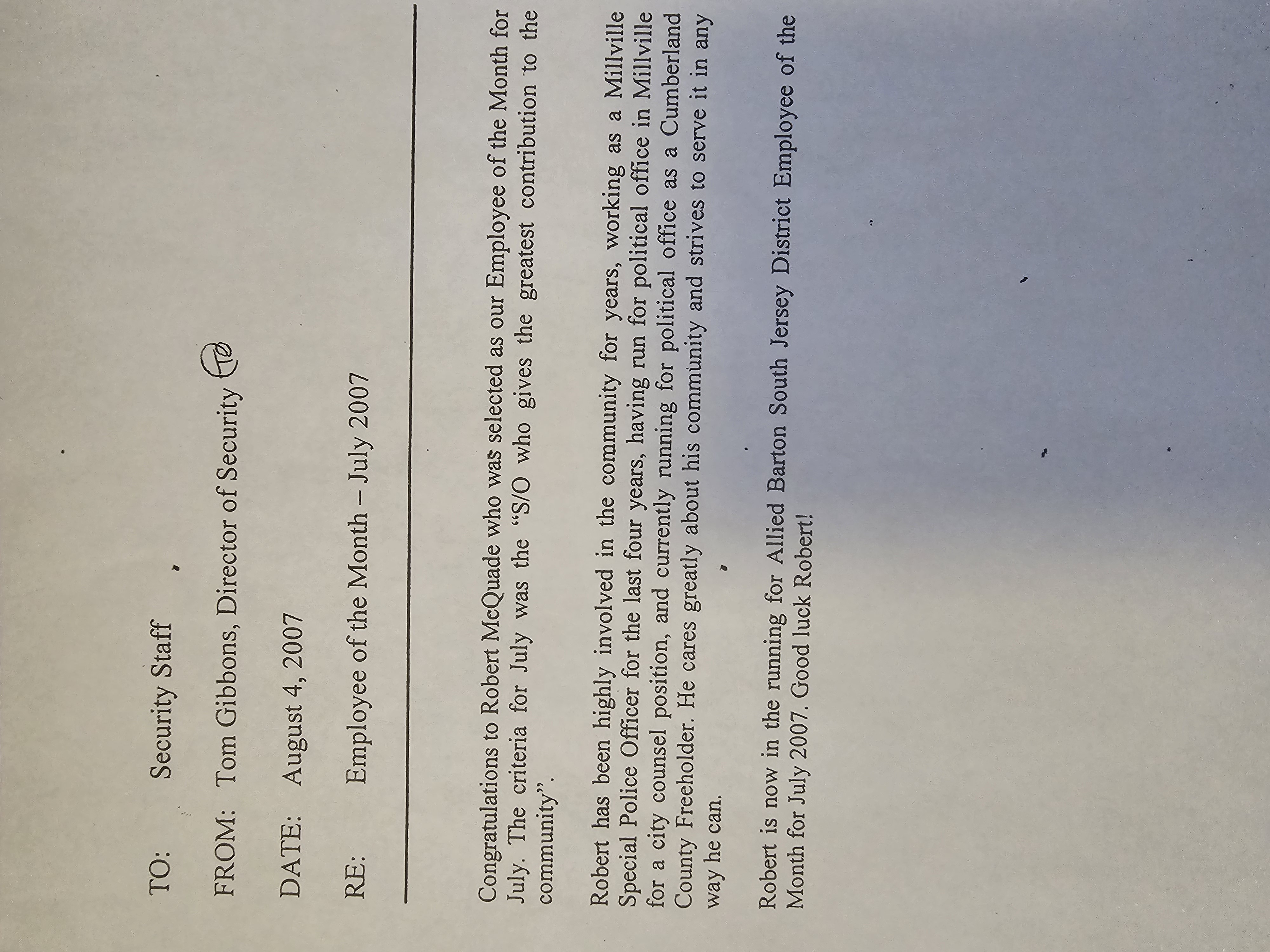
Recognition from Mayor of Millville
If on desktop, right-click the image and select 'open in new tab' for a larger image
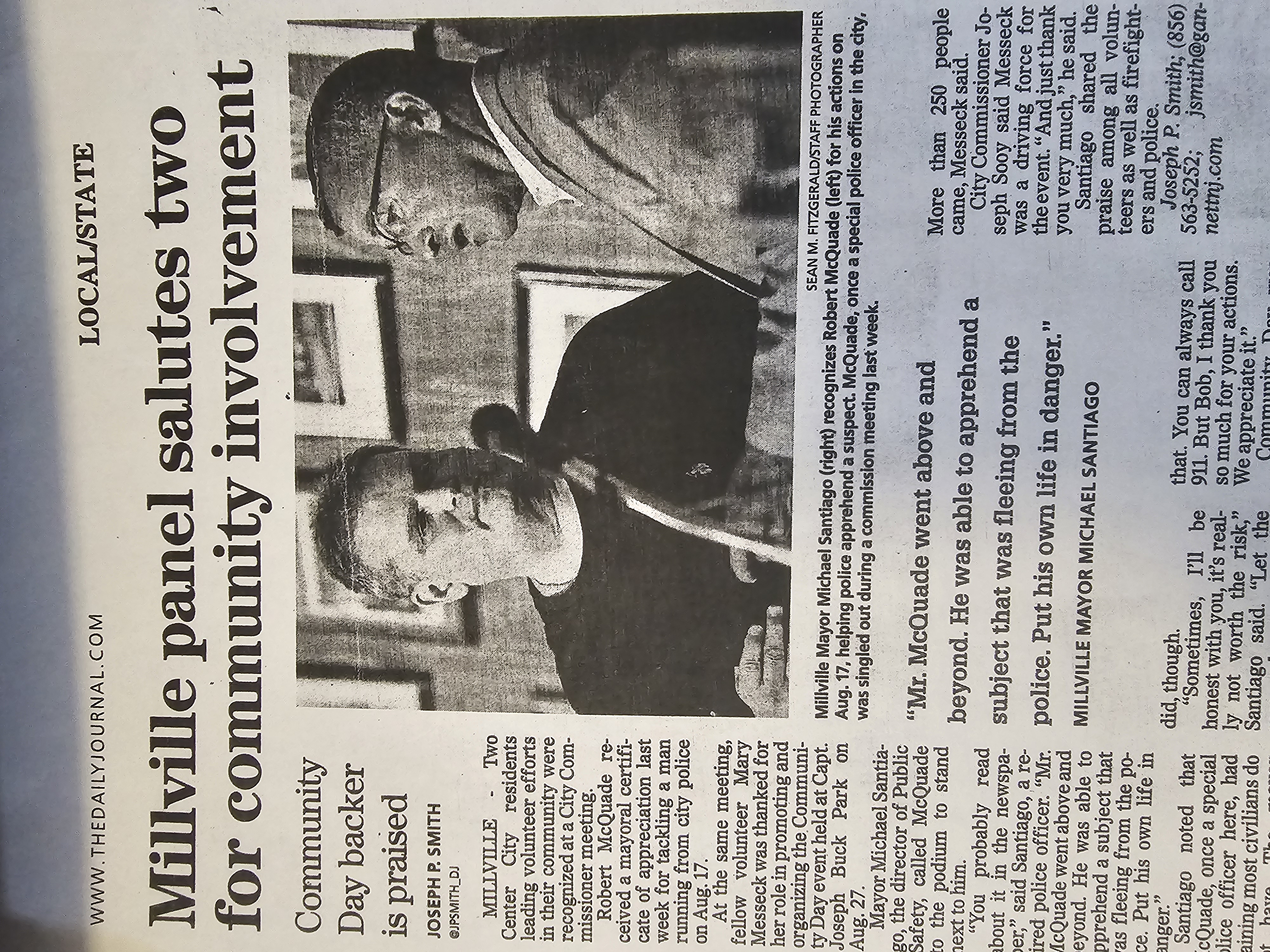
Millville Officer Award
If on desktop, right-click the image and select 'open in new tab' for a larger image
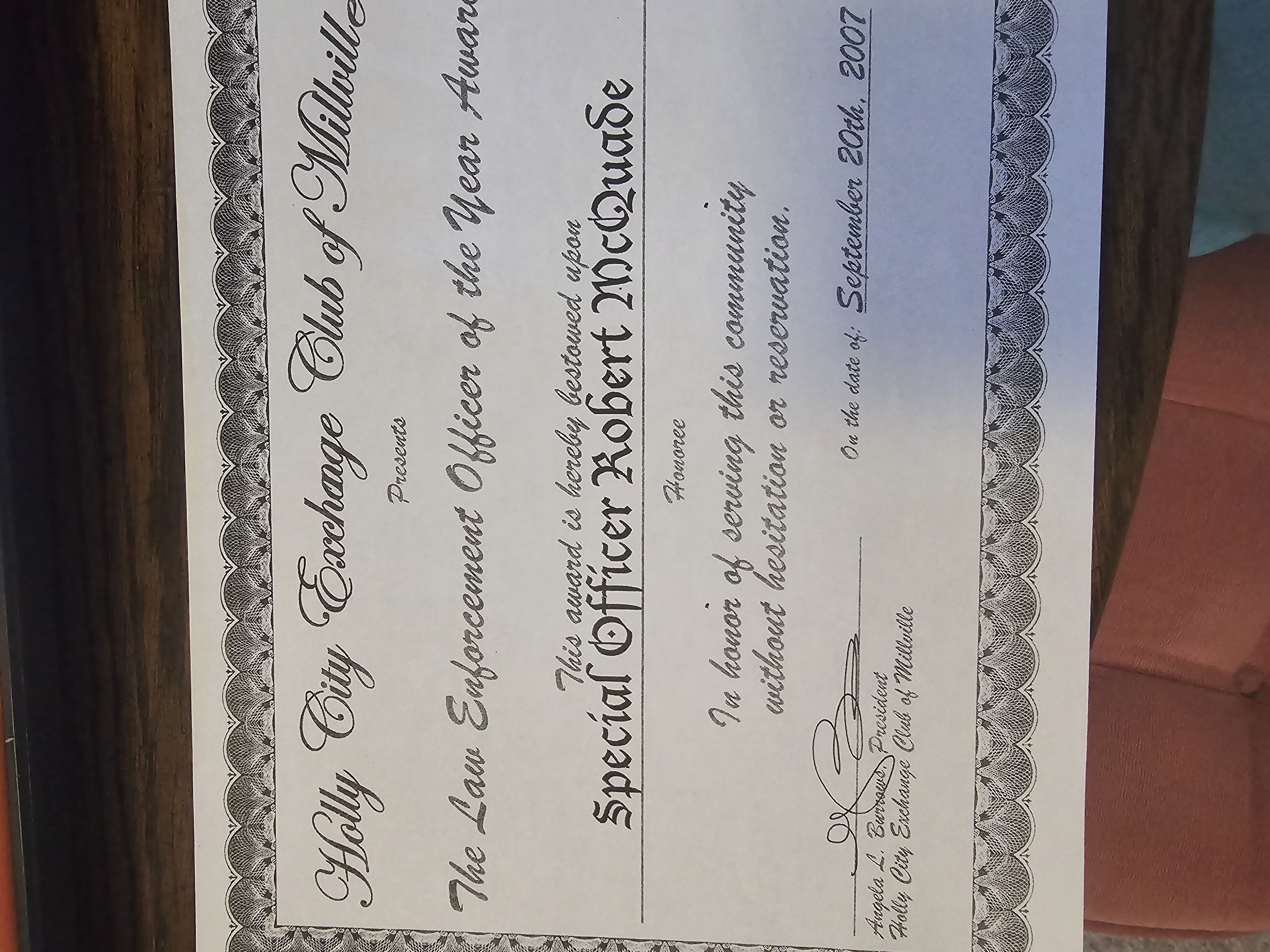
Millville Police Department Recognition
If on desktop, right-click the image and select 'open in new tab' for a larger image
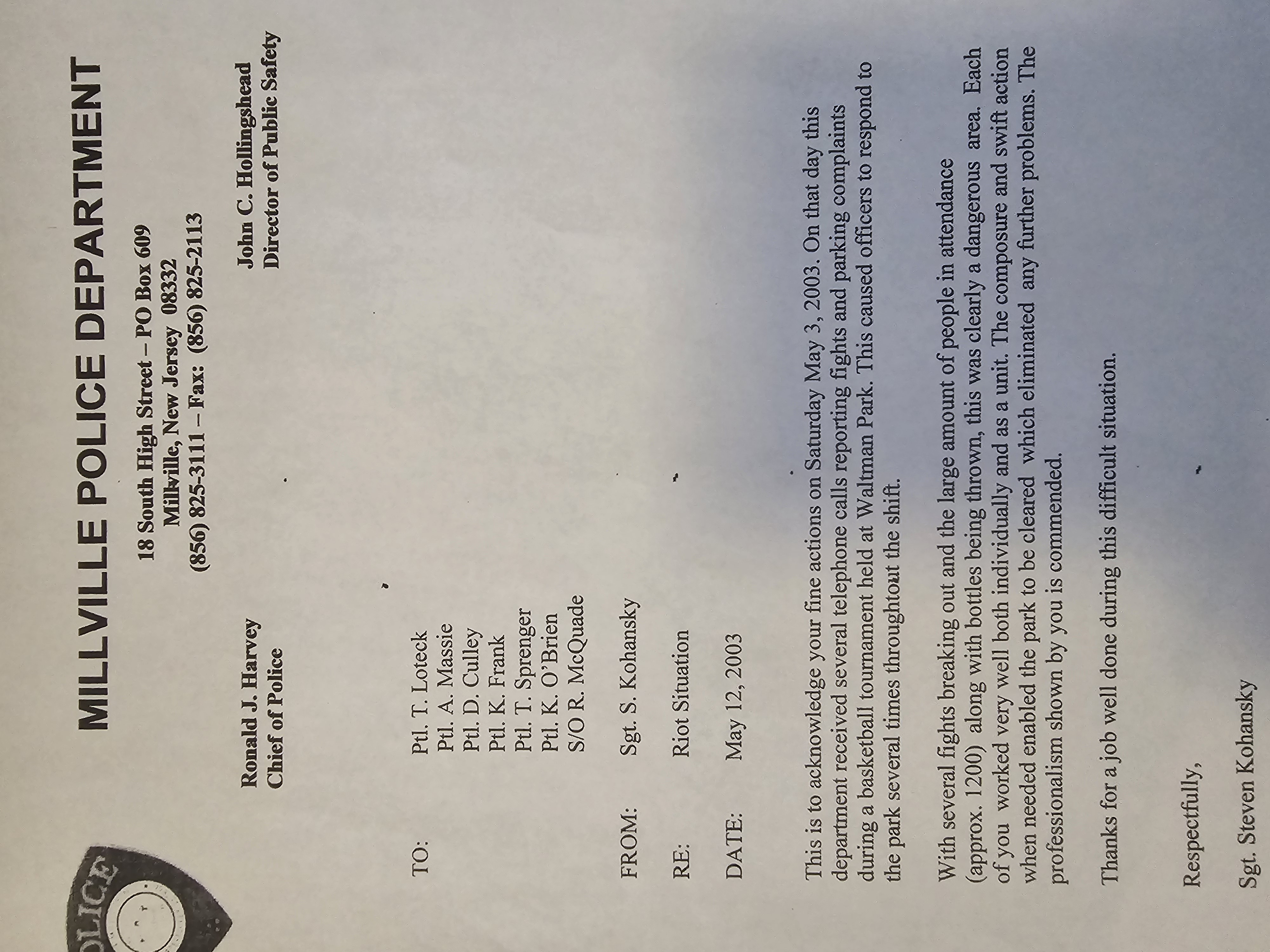
Recognition from City of Millville
If on desktop, right-click the image and select 'open in new tab' for a larger image
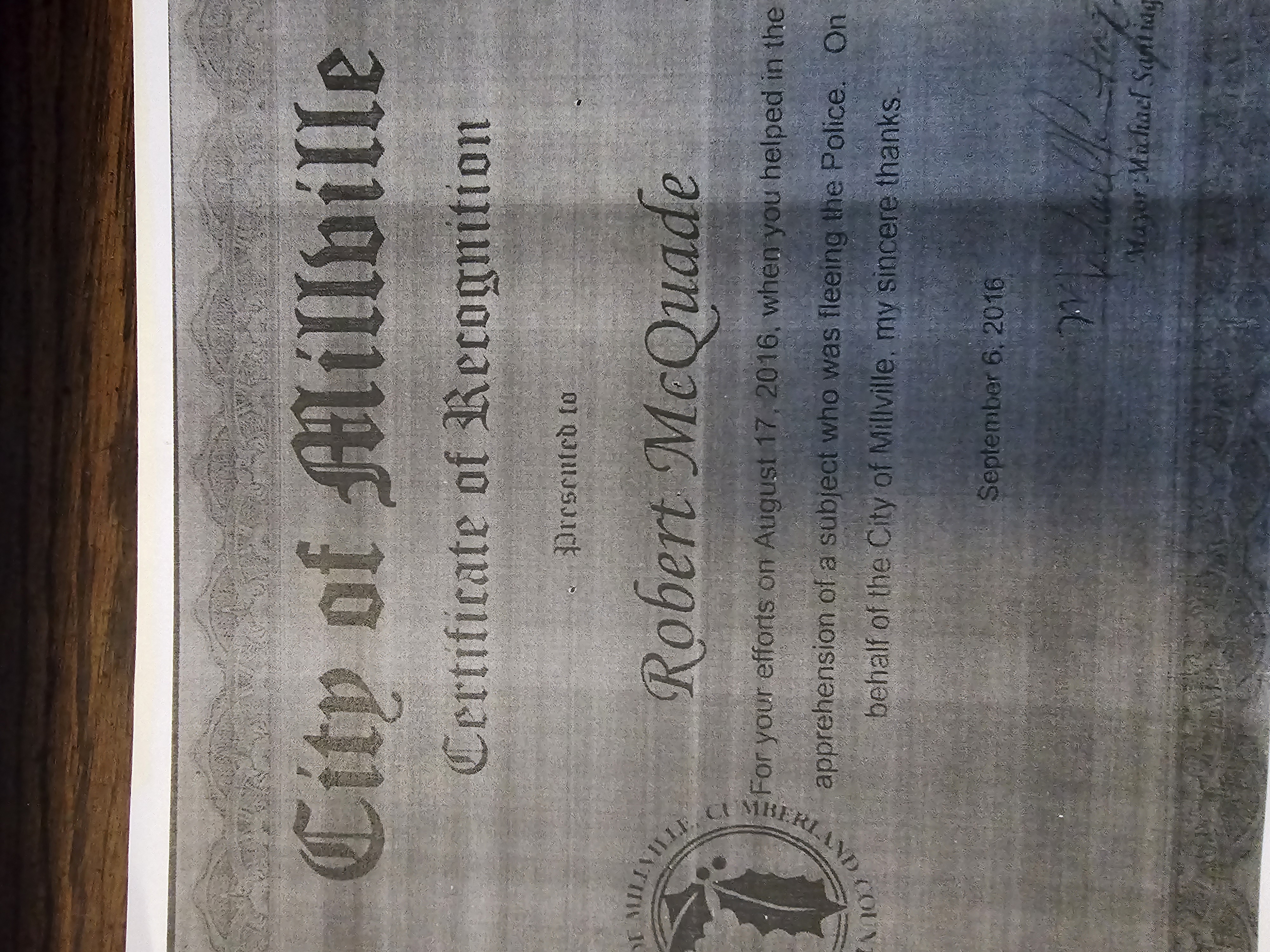
Recognition from Sergeant
If on desktop, right-click the image and select 'open in new tab' for a larger image
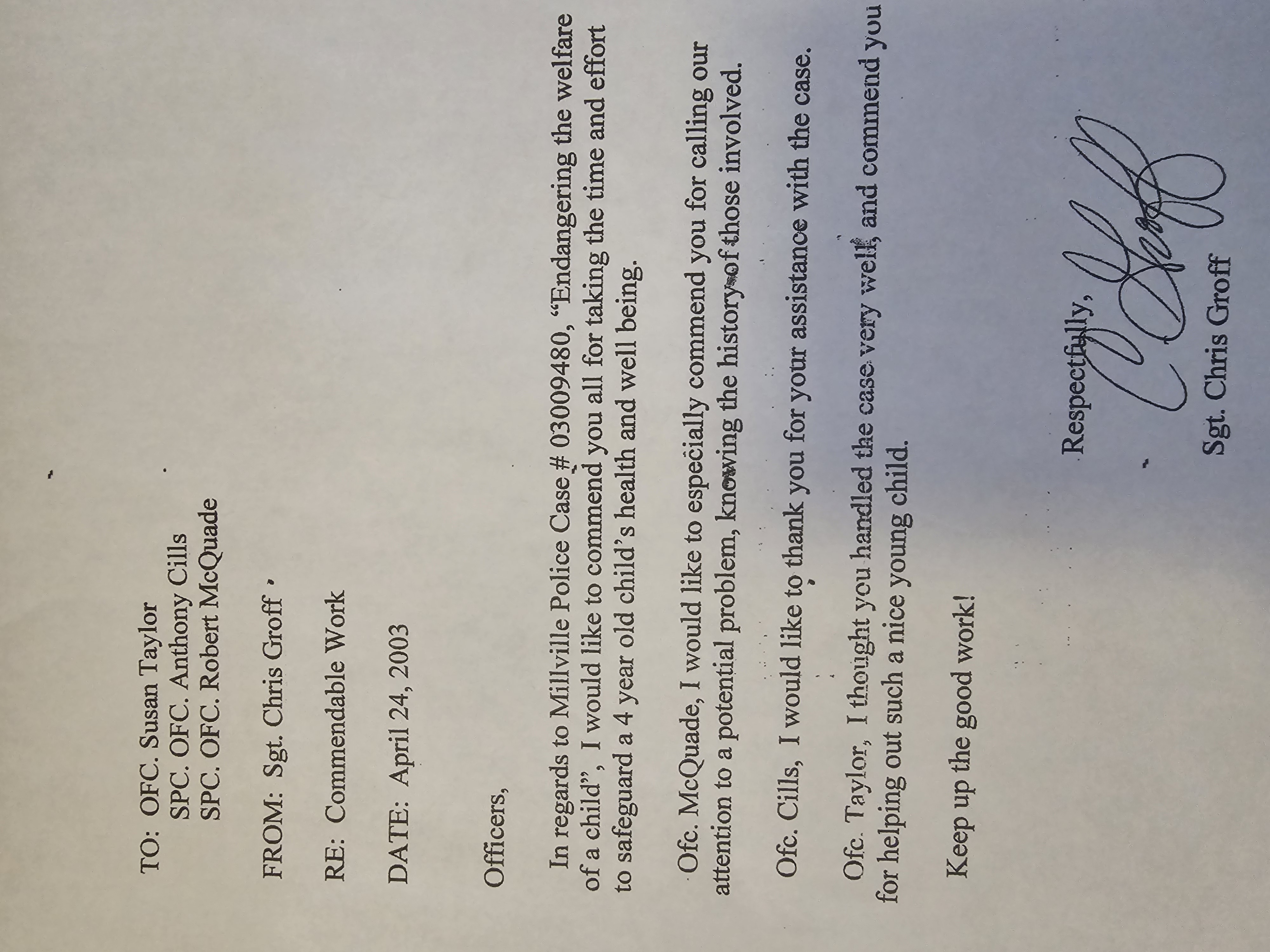
Online articles: